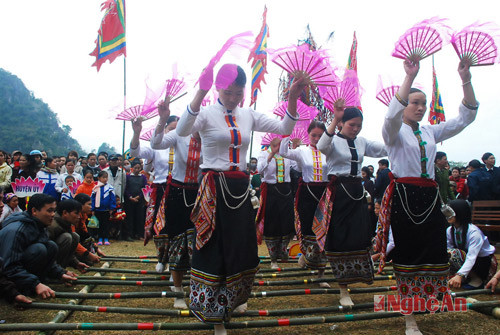Preserving traditional cultural beauty
(Baonghean)-January is the season of festivals. Festivals are activities that preserve traditional cultural values, which have positive meanings for people's spiritual and cultural life. Therefore, for generations, festivals have been maintained in community life with their characteristic colors.
In recent years, festival activities have undergone many changes with negative manifestations, commercialization, superstition, and the fading of cultural, ethical, and religious values. Therefore, it is necessary to have synchronous corrective measures so that festivals are truly cultural activities, contributing to protecting and preserving the traditional cultural beauty of the nation.
Going to festivals at the beginning of the year to relax, to get rid of the burdens and worries of the old year and to hope for good things in the new year; going to the temple to pray for peace for oneself and one's family, for a good life is a legitimate human need that needs to be respected. Especially in a modern society with many changes and uncertainties, such a need is understandable. However, for a part of the population and officials now, spirituality has become a practical need. People who go to festivals are determined to "pray for" what they want, even selfish or unwholesome things. They do not care about any "method" of praying, borrowing or begging the gods, as long as they can get "the fastest, the most, the best" things they wish for.
 |
| Bamboo dance at Bua cave festival - illustration photo |
Therefore, in the first steps of the new year, temples and pagodas become the number one target of many people. When votive paper and hell money no longer seem to have enough power, people who go to the temple use even bank money to stuff directly into the hands of gods and Buddhas; they scatter money everywhere as if without bribery or "envelopes", gods and Buddhas will not accept their prayers. Because of pragmatism, many people who go to the temple have equated values, bringing the consequences of everyday life into the spiritual world. Going to temples and pagodas at the beginning of the year from a sacred and respectful place has turned into a scene of jostling, pushing, and praying. Not to mention far away, right in the capital Hanoi, in recent years, people have always witnessed the scene of thousands of people jostling and pushing each other during the New Year's Prayer Ceremony at a temple near Nga Tu So, the temple yard was full, they spilled out onto the street, many people stood on the bridge praying from afar, obstructing traffic. There was no sign of peace, only insecurity was present. Then the scene of "head-splitting" bamboo flower robbery at the Gióng Festival; then jostling and trampling until fainting at the Tran Temple Seal Opening Ceremony...
Festival-goers are pragmatic, but the pragmatism has spread to the organizers and sponsors of the festival, which is worth discussing. Every festival tries to invite leaders to attend, as if the bigger the leader, the more magnificent the festival. Taking advantage of the name of festival innovation, linking festivals with traditional education, with tourism... in many places, the Organizing Committee, to varying degrees, has imposed a number of available scenarios, making the proactive and creative role of the people - the subject of the festival - fade. Some festival sponsors want to take this opportunity to polish their names. Public opinion has sternly warned about an anti-cultural game that causes disgust to the community, which is the "record game" at traditional festivals. From the story of the record of Chung cake and Day cake weighing several hundred kilograms offered to the Hung Kings a few years ago, these cakes have become stale by the time of offering, becoming a disrespectful game to the ancestors. Then Lim Festival also tried to "set a Vietnam Guinness Record" with 2012 people wearing Quan Ho costumes and singing Bac Ninh Quan Ho folk songs to coincide with the year of organization 2012. Perhaps the Organizing Committee came up with such a strange game to promote Lim Festival but forgot that, to preserve and promote the national cultural identity in general and the festival in particular, first of all, we must preserve the quintessential beauty, the simplicity of folk performing arts and the community spirit that creates the global value of Bac Ninh Quan Ho folk songs recognized by UNESCO.
Culture and religion always aim for goodness, always aim for the community in an innocent and pure way. Religion is never synonymous with pragmatism and selfishness. That is to say, if manifested, gods and Buddhas will never help those who bribe temples to gain positions, do bad things, seek personal benefits, regardless of the community and sacred teachings.
Every year, nearly 8,000 large and small festivals are held nationwide. Therefore, the issue of festival management is always of concern to the Department of Culture and Party Committees and authorities at all levels. The Ministry of Culture, Sports and Tourism has just issued a document directing localities to strengthen the organization and management of festivals in 2016, raising people's awareness and the responsibility of the authorities to establish order and civilization for festivals to preserve traditional values, meet the cultural and spiritual needs of the people, and ensure that the first festival of the year is simply a traditional folk cultural activity, expressing the humanity, humanism and democratic aspirations of the people for a peaceful life.
Van Thieng
| RELATED NEWS |
|---|






